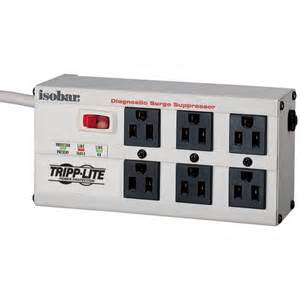If lightning hits the distribution wires, no surge protector is going to stop the spike.
Again, you demonstrate why scams work. Explained was how direct lightning strikes cause no damage. But ignored to again recite what propaganda needs you to believe. Confusion abounds when one remains attached to a myth - that protection is about *stopping*. Nothing stops lightning. Direct lightning strikes without damage was routine even 100 years. Please unlearn myths that promote a Tripplite, APC, or Furman "magic box". An informed human never tries to *stop* a surge. Magic boxes do not work.
Second, Early Streamer Emission devices also claim to *stop* lightning. That scam even claims to "discharge" air; thereby *stopping* lightning. Red Tomato demonstrated what *diverts* lightning. One must completely ignore what was posted to think that is *stopping* lightning. Reality is never found in soundbytes. Soundbyte recommendations (ie Tripplite or a UPS) claim to *stop* lightning.
Lightning rods protect a structure. Topic is about protecting an appliance. Appliance protection works for same reasons that lightning rods protect structures or rockets on a pad awaiting launch. Effective protection never *stops* a surge.
Third, easily manipulated consumers identify themselves by hyping a mythical Tripplite or Furman solution. An obviously bogus solution is a UPS. Even UPS manufacturers do not claim to protect from destructive surges. Then use what works on the most easily scammed. They claim it will *stop* lightning where lying is legal - using subjective claims in sales brochures and advertising. A wirecutter.com citation also demonstrates how profits are created using misinformation. Again, where are required spec numbers that claim protection? Why is every bogus solution promoted without even one number?
Apple-ette thought this
APC would provide reasonable protection due to due diligence. Where was one spec number that claims that protection? None exist. They made subjective claims where lying is legal. Subjective claims are obscenely profitable. Somehow the APC would *stop* a surge.
That APC and other devices do something useful only if a 'whole house' solution is properly earthed. A surge is not *stopped* by a 'whole house' solution. Therefore it is so effective. Surges are harmlessly *diverted*to and joules *absorbed* by earth ground.
Structure is protected by lightning rods; connected to earth.. Appliances protected by something completely different but also called a surge protector; connected low impedance (ie less than 3 meters) to earth.
Earth ground has no model number. Earth is not advertised since selling ground is not obscenely profitable. Many educated by advertising would only know APC, Trpplite, Furman, and other wirecutter.com myths. Many are only educated by advertising; not by science. So many still do not know about an only item that does protection - earth ground.
Bottom line: protection means a hardwire connects lightning harmlessly to earth. Or a protector does what that hardwire does better. Then surges (ie lightning) are not *stopped*. Then damage from a direct lightning strike is averted. The energy is harmlessly *absorbed*.
Unfortunately many paragraphs are needed to explain how protection was done even 100 years ago. And why *stopping* is not a solution. Routine are direct lightning strikes without damage. So routine that damage is directly traceable to a human mistake.
Where is even one spec number that claims that above Tripplite does anything useful? None provided because none exist.



